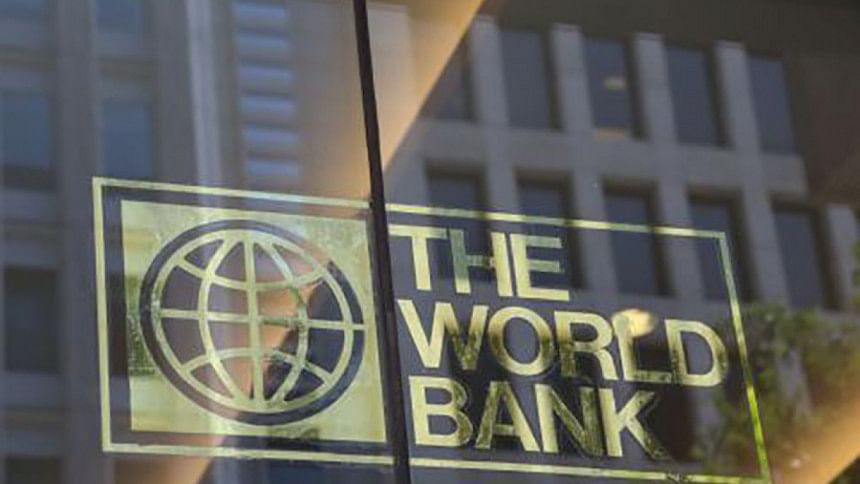Will the World Bank eat humble pie?

It was once a familiar refrain amongst the restaurant-goers in Dhaka that even if one didn'teat or drink anything in a restaurant, one could still end up paying twelve annas for breaking a drinking glass. That saying embodied concerns over the costliness of eating out and its incidental hazards, but eventually acquired a deeper meaning of life. It implies a Kafkaesque helplessness when one has to pay for something without partaking in any of its pleasures. Almost five years later, the Padma Bridge scandal looks like a throwback to that disturbing despair. Some people may have paid the price without doing anything significantly wrong.
Unless the World Bank knows something we don't. The bank now seems to be the sole custodian of a scandalous secret, dutifully guarding the entrance of truth like Anubis guards the entrance of the underworld in Egyptian myths. The global lender, for reasons best known to itself, seems to have taken an unbreakable vow of silence.
Meanwhile, others have spoken out loud. On February 10, a Toronto court acquitted three former officials of SNC-Lavalin, who were accused of planning to bribe Bangladeshi officials to secure a consultancy contract in the Padma Bridge project. This accusation formed the eye of a storm that forced a minister to resign, a secretary sent to jail, and the project director removed from his post. It also brought shame for us watching our country dragged through the mud.
Now we feel ashamed of being ashamed, and only the World Bank can save us from this terrible embarrassment. It knows what had happened and why it cancelled the USD1.2 billion IDA credit for the bridge. The construction of the Padma Bridge, which is going to connect 21 districts with the country's capital, got delayed while the cost multiplied. Lucky for Bangladesh, it stuck to its guns and mobilised Chinese loans and internal resources not to give up on that dream.
Whatever transpired between their government and the World Bank, the people of this country have paid the price. They not only suffered the awkwardness of a scandal that involved their government, but also withstood the anguish of watching their country being put on the spot. They have also lost time on the benefits of a more connected country. The budget for the bridge multiplied to Tk. 288 billion from Tk. 102 billion in 2007.
What the World Bank has done compares to a hit-and-run accident. The international agency made a serious accusation and then fled the scene, leaving behind a wounded nation of 160 million to live with the consequences. If this is how the bank wished to behave, it should have been more discreet about the whole thing. Nobody is guilty until proven. The World Bank upended that maxim of law by maligning our country before it proved anything beyond doubt.
The burden of proof always lies with the accuser. The World Bank owes it to the people of Bangladesh and the rest of the world to show how it's right. So far this global body appears to have demonstrated the scruples of a village hag, who goes around spreading slanders just for fun. The bank may use its policies as a shield for its reticence. But after it brutally defamed a country, it simply can't hide behind that purported smokescreen.
The Bangladesh government couldn't have thrown out a more open challenge than it did after the recent Canadian court verdict. Our Prime Minister has even named the names to establish her claim that the cancellation of the World Bank loan for the Padma Bridge was a part of the sinister design to twist her arm. The World Bank should realise that while it may think silence is golden, its silence is actually giving consent to that cynicism.
"Speak now or forever hold your peace," is a trope usually used in Christian matrimonial proceedings. If the World Bank doesn't open its mouth now, it should never talk about it again. It has already confused us twice, first by levelling an accusation against this country and again by refusing to corroborate it. If nobody has eaten or drank anything, nobody should have to make the ludicrous payment for breaking a glass.
Will the World Bank eat humble pie? It depends on how confident our government feels that no wrong was done. It can pursue this matter in international forums, work with the international media, and take it up with the governments of countries which donate big money to the World Bank. Going to the court is another option.
Oscar Wilde defines scandal as gossip made tedious by morality. We have had enough gossip over the Padma Bridge scandal for almost five years. Now is the moment of truth. If the World Bank doesn't open up, morality will degenerate into scandal made tedious by gossip.
The writer is Editor of the weekly First News and an opinion writer for The Daily Star.
Email: [email protected]

 For all latest news, follow The Daily Star's Google News channel.
For all latest news, follow The Daily Star's Google News channel. 



Comments